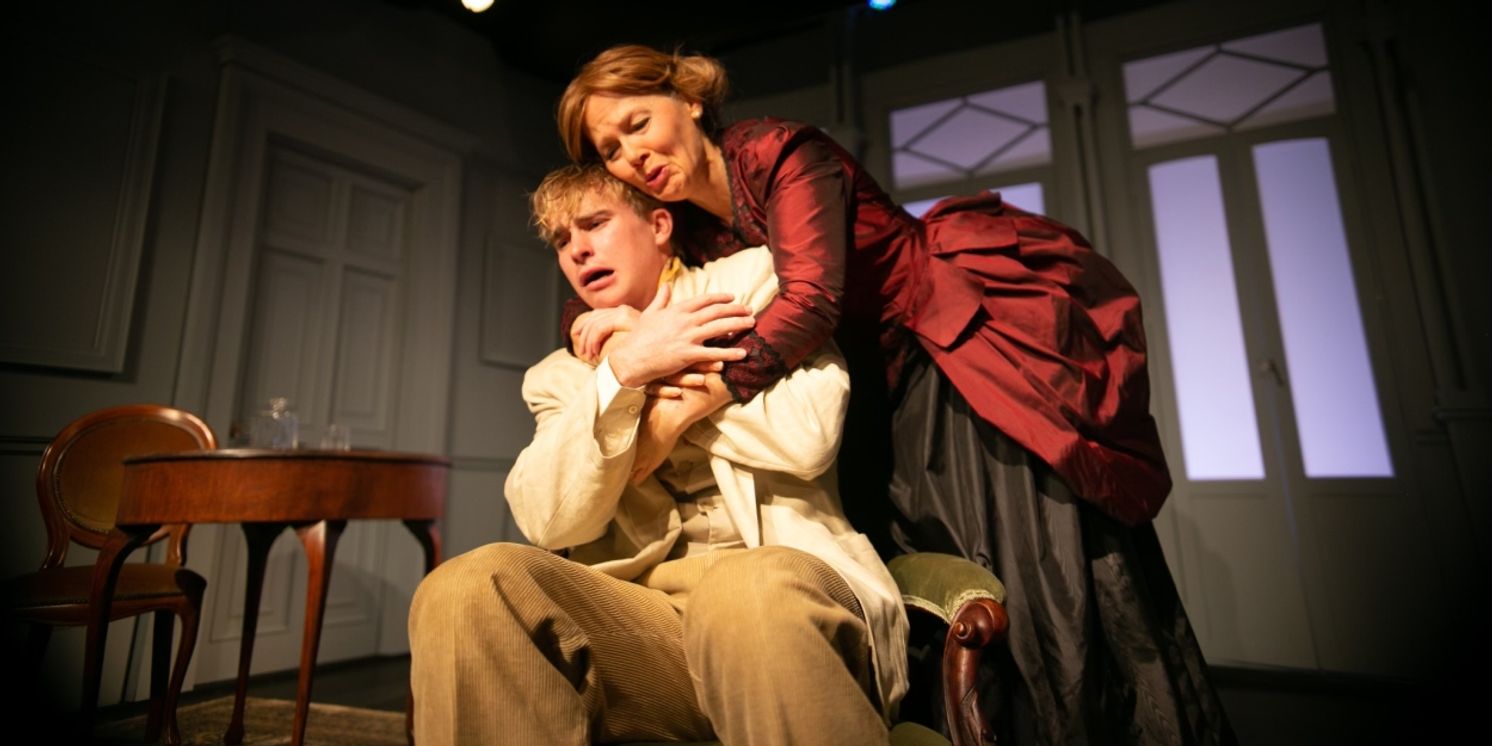Review: GHOSTS at Star Theatres
The play that shocked audiences in 1881.

Reviewed by Ewart Shaw, Wednesday 21st June 2023.
Independent Theatre has chosen to stage Ghosts, Richard Eyre’s adaptation of Ibsen’s Gengangere, in the smaller venue at Star Theatres. The entire space mimics that of a drawing room in an upper-middle-class house bringing the audience right into the heart of the play, as ghostly observers. The most important ghost is that of Mr. Alving, husband and father, whose legacies shape the play. Ibsen’s great plays, so influential on drama since his day, burrow into respectability like a spirochete, growing and infecting, until the ugly truth cannot be concealed. This is a compelling production, even as deception and disclosure come hard on each other's heels at almost farcical speed.
Helene Alving, a rich widow, has welcomed home her son Oswald. He’s a painter who has been living and working in Paris for many years. He’s home because his mother has paid for the construction of a children’s home, an orphanage, to be named in her late husband’s memory. Oswald is sick, with a sexually transmitted disease that in Ibsen’s day was incurable, a death sentence. How he came to suffer this is one of the mysteries explored in the play. Oswald has fallen for his mother’s maid, Regina. The truth about her parentage will also be disclosed.
In the course of the few hours of stage time, and the ninety minutes of this production, the fantasy that Helene Alving has nurtured through her letters to her son, of paternal decency, is incinerated. Director, Rob Croser, has cast Lyn Wilson as the mother and Eddie Sims as the son. This is a superb pairing that reaches its violent and confronting conclusion in the final minutes, when yet another sin is exposed. Wilson begins, elegantly dressed, as a woman whose control is second nature, and, as the story unfolds, it crumbles and she ends physically grappling with the consequences of her family’s past. Eddie Sims is outstanding as Oswald, grappling with the sudden attacks of his disease, and he communicates his desperation excellently. Those blinding headaches, the stroke Oswald suffers in the last few minutes are gut-wrenching. Local doctor, Nikhil Tamminedi, gets a program credit for his invaluable medical advice.
Chris Duncan is Pastor Manders, the man Helene might have married had she not chosen Alving for his money. His is a well-made portrayal of a man whose religious convictions crumble as the play explores and explodes the conventions of his life. Sophie Livingston-Pearce is the maid, a new addition to the Independent Theatre Company, and she’s well placed to develop her ambitions.
David Roach is Jacob Engstrand, a bit of a chancer. The character, as written by Ibsen, spoke in a regional dialect that marked him out as inferior to the polite vocabulary of the Alvings and Manders of the neighbourhood. Richard Eyre makes him speak in a Scots accent. You want ethnic stereotyping?
A Rob Croser program is always more than just a list of cast, crew, and credits. He collects scholarly articles, reviews, and observations, filling in the history of the play. There’s a warning notice in the program, advising people unfamiliar with the play not to read on until after they’ve seen it.
I think it will be easier for me to tell you a few things that will explain why the play was such a shock to its first audiences. Oswald has syphilis. His mother contracted it from his father, but, such is the nature of the disease, she was probably not aware of the situation, and passed it to Oswald at his birth. Regina is Oswald’s half-sister. Her nominal father is Jacob Engstrand. Mrs Alving has always known this and the possibility of incest is just one of the many things that rises like a ghost from the past. Those first audiences must have been overwhelmed by the catalogue of deceptions and disease played out in front of them, as Ibsen sets fire to social pretensions.
The children’s home, the building of which is an act of contrition as well as the continuation of Mrs Alving’s desire to protect and continue her desperate concealment of the truth, burns down, the night before it is to be opened. It is a grand and complex metaphor. A home of safety for the young is destroyed like Oswald’s home life and history The pastor’s negligence with a candle from the prayer service, and the wood shavings, is the cause. Jacob Engstrand will take the blame, saving Pastor Manders from censure, but his price is the money for his planned hostel for naval officers. That this will, indeed, be a high-class brothel is never stated directly, but it’s pretty clear that this is what Engstrand has in mind. The role he expects his daughter Regina to play is less explicit.
In the course of the few hours of stage time and the ninety minutes of this production, the fantasy that Helene Alving has nurtured through her letters to her son, of paternal decency, is also incinerated.
Reading Croser’s exhaustive collection of critical articles about Ibsen and quotes from the playwright, I was struck by a quote from the 18-year-old James Joyce “If I may say so of an eminently virile man, there is a curious admixture of the woman in his nature. His marvellous accuracy, his faint traces of femininity, his delicacy of swift touch, are perhaps attributable to this admixture. But that he knows women is an incontrovertible fact. He appears to have sounded them to almost unfathomable depths.”
”That was why I liked him, because I saw he understood or felt what a woman is and I knew I could always get round him, and I gave him all the pleasure I could.” That’s Molly Bloom in the last pages of Ulysses.
Reader Reviews

Videos

